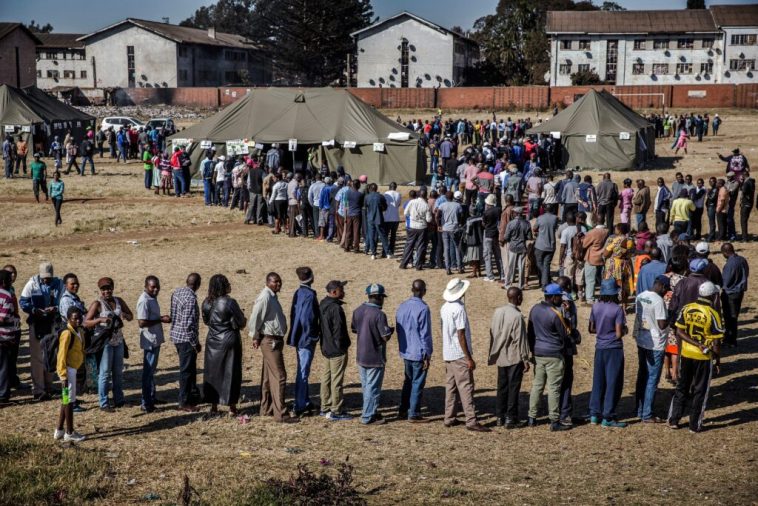
BY LORRAINE MUROMO/PRIVELEDGE GUMBODETE
LOCAL think-tank Zimbabwe Democracy Institute (ZDI) and election watchdogs — Election Resource Centre (ERC) and Zimbabwe Election Support Network (Zesn) — yesterday described the run-up to next week’s by-elections and next year’s general elections as heavily manipulated in favour of Zanu PF, with the Zimbabwe Electoral Commission (Zec) reportedly “placed at the epicentre of the electoral manipulation machinery”.
The ZDI, in an analysis of the ongoing voter registration process, claimed Zec had created uncertainty over voter registration, manipulated the voters’ roll, registration centre allocation and militarised the exercise.
The ZDI report said in areas such as Harare and Bulawayo where the opposition commands a huge following, there were fewer registrations centres as revealed in Zec’s schedule of the first mobile voter registration process which kick-started on February 1, 2022.
“For example, Bulawayo, an opposition dominated province, has been allocated 152 voter registration centres while the Zanu-PF stronghold Midlands province was allocated 354 voter registration centres. It should be noted that the opposition got 11 parliamentary seats while Zanu-PF got zero seats in Bulawayo in the 2018 election whereas, in Midlands Zanu PF got 22 seats while the opposition got six seats. When Zec increased voter registration …there is no doubt that it deliberately aimed at enabling more Zanu PF supporters to register while suppressing registration of opposition supporters.”
Zanu PF secretary for administration Obert Mpofu said: “We have no contact with Zec at all. What you are saying is coming from an organisation that is in contact with Zec. As Zanu PF, how do we get involved. The only time we get to approach Zec is during the normal candidate selection process.”
The ERC and Zesn produced a joint statement, accusing traditional leaders and civil servants of being partisan and showing bias towards the ruling party.
“Observers reported challenges within the broader political environment surrounding voter registration, such as traditional leaders and civil servants taking part in partisan activities and reports of violence and intimidation,” the statement read.
Section 281(2) of the Constitution states that: “Traditional leaders must not (a) be members of any political party or in any way participate in partisan politics and (b) or act in a partisan manner.”
Traditional leaders have often been accused of forcing their subjects to support Zanu PF during elections to the extent of threatening to take away their land if they support the opposition, or denying them government-sourced food aid.
The civic groups also noted incidents where civil servants were involved in organising ruling party campaigns.
“A civil servant when on duty cannot take a partisan approach. If Zanu PF has a programme it’s a programme for their party and not the government and they ought not to attend those programmes. During these current rallies, we have senior civil servants and traditional leaders who are attending those rallies and also helping with organising them,” ERC programmes manager Solomon Bobosibunu told NewsDay.
“That goes against the grain of the Constitution…if you followed the ZBC during inauguration of one chief in Chiweshe, some chiefs were heard stating that people must support Zanu PF and that is against the Constitution,” he said.
But Chiefs Council president Fortune Charumbira denied the charge and challenged the electoral watchdogs to name the traditional leaders taking part in such unlawful activities.
“We as chiefs are impartial during elections. If anything, we are helping everyone to go and register to vote. If chiefs are doing that we are not aware. As the national council of chiefs, we need to investigate any issues of harassment, intimidation or any issue caused by members of our institution. We urge Zesn and ERC to produce names of the chiefs who are doing this so that it becomes easier for us to investigate the issues,” said Charumbira, who last year caused a storm after he declared that chiefs were Zanu PF stakeholders.
ERC and Zesn report also urged Zec to improve on accountability and facilitate local groups to know when to complement its mobilisation efforts as the country gears up for the 2023 general elections.
Recently, Zec was accused of illegally transferring about 170 000 voters from their original constituencies and wards in the voters’ roll to be used for the March 26 by-elections.
“Zec must improve on information sharing (registration statistics) at the point of registration especially with accredited of observers as this helps to increase accountability as well as facilitate local groups to know when to complement the mobilisation efforts.”
ERC and Zesn said Zec should also consider engaging an independent firm of auditors to audit the voters’ roll, as a confidence-building measure following the controversy surrounding the current voters’ roll.
Zec chief elections officer Utoile Silaigwana said he had not yet received the ERC and Zesn report.
Contacted for comment, Zec spokesperson Joyce Kazembe said: “I was not in the office today and so you can email your questions so that I can give you a proper response tomorrow when I get to the office. I need to see the ERC and Zesn report first.”
Follow us on Twitter @NewsDayZimbabwe


